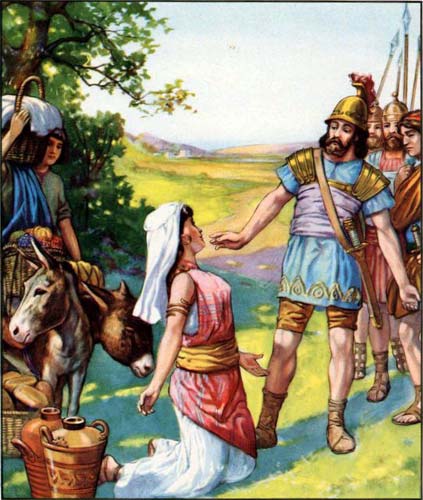Once upon a time, there was a woman whose name was Abigail. She not only was beautiful, but she was also very wise. She was the apple of her parents’ eyes. She grew in grace and knowledge, and gained the favor of those who knew her.
So naturally when it came time to get married, Abigail’s parents tried to find a young man suitable for their daughter. They had heard of a young man in their village, named Nabal, a man destined to inherit his father’s land and animals. This young man had seen Abigial; she was lovely and smart, and he quickly consented to her hand in marriage. Abigail’s parents were thrilled; their daughter’s future seemed secure with this presentable and charming young man.
Oh, poor Abigail, little did she know. A young man may appear to be handsome, and may be courteous during the time of courtship, but once the marriage vows are spoken, a different person replaces the beaming groom. Nabal– you fooled ’em all.
Such was the case for Abigail. Her husband turned out to be an angry– and a foolish– man. He was wont to indulge in heavy drinking and feasting with the men on his farm, spending lavishly on himself, for his own pleasures. Drunken merry-making was not an uncommon event witnessed by Abigail.
Somewhat naive in the ways of the world, and trusting, she was confused and frightened at first. Surely her husband had been working very hard, and deserved some fun and relaxation. And surely he did not mean the angry words he sometimes spoke to her; nor did he intend to treat her roughly. He was simply exhausted, under a great deal of stress, and needed a rest. And perhaps, thought Abigail, she herself could have done a better job of staying out of his way. Perhaps if she tried harder….
Poor, poor Abigail. As time went on, and the same scenario repeated itself, Abigail realized the true nature of the man she had married: a self-centered, self-righteous you-know-what. He dealt harshly with her, and the servants on the farm were scared and distrustful of him. She became to understand that the problem was not really her– it was him. And she began to learn when to stay out his way, and how to carry on during his terrible episodes. There were times she had to run the business of the homestead by herself, as her husband was either unreasonable or incapacitated. Over time, she had earned the trust and respect of the servants of the household, and Nabal’s harsh reputation was spread among the workers.
One day, the future king of the land, a certain Mr. David, and his entourage, happened to come into the territory. Nabal was busy shearing sheep, as it was the sheep-shearing season. While Nabal was about this business, the future king David and his gang protected Nabal’s animals (thousands of them) grazing in the fields, and the farm workers looking after them, from thieves and treachery.
Now it was the time of a great feast, when the people made great quantities of food, and were especially generous to one another. Thus, the future king David felt confident to send a few men to approach the master of the house and ask to be given whatever he deemed fit to give; he asked for no specific payment for the services of protection rendered on the land than for whatever seemed fit to give.
But Nabal refused to share any portion of his food with David’s men, claiming he did not know who David and his men were, and wouldn’t share with just any stranger. In other words, this foolish man did not even say thank you, acknowledge David’s assistance and kindness, and even claimed that David could be the run-away servant of some other person. Whether or not Nabal did indeed know he was scoffing the future king, he shows an incredible amount of stupidity.
When David heard this response, he and 400 of his men started sharpening their swords.
Immediately, a servant of Nabal’s household went straight to Abigail and told her everything about his incident. The servant trusted her obviously. He wasted no time. The servant confirmed David’s story– that they were good men, protecting them, but Nabal reviled them. And, now, David and his men were planning to come after Nabal and the entire household. He calls Nabal “a scoundrel” and says that no one can even speak to him.
Wow. A male servant of the household apparently trusted Abigial enough to not only share this story but also refer to his master (Abigail’s esteemed husband) as a “scoundrel”. Upon hearing all of this, what does Abigail do? Well– let me tell you. She surely doesn’t question the servant’s story nor does she try to defend her husband, nor is she offended. This whole exchange suggests that Nabal’s foolishness is known among his household, and that Abigial has proven to be a trusted confidant in a house with a tryant. At least the servants have figured out where to go and who they can trust.
What does Abi-girl do? She takes some major action.
She quickly starts dispatching orders: “collect the 200 loaves of bread already baked for the feast”, and take “two skins of wine,” grab “100 clusters of raisins”, pack up “200 cakes of figs”, and take the “five sheep already dressed”, and had all of these, plus some grain, loaded on some donkeys. She tells her servants to start walking on toward David, and that she’ll bring up the rear. Hmmm. She very wisely sent the provisions first.
She did all of this, but without Nabal’s knowledge. Abby’s got some gumption.
Do you wonder if she had time to roll her eyes? This one was a biggie, though, so she probably had no time to do anything in this instance but take quick action. She’s had to come to the rescue before– but this instance was a matter of life and death.
She came, on her donkey, approaching the formidable sight of David and his men– their swords already girded and ready for action– angry and ready to fight. They weren’t amused. You see, David had told his men that Nabal had paid him evil for good and that they would not leave a single male alive in Nabal’s house when they attack that very evening.
Fear gripped Abigail’s heart as she saw the grim faces ahead of her, and she lifted up many prayers as she approached David.
When she neared him, she dismounted quickly and fell on her face, bowing before David,  and humbly begged for his forgiveness, and for the foolishness of Nabal. She called Nabal a scoundrel, too. She says she did not know of any of these happenings between his men and her household. She pleads, “…since the Lord has held you back from coming to bloodshed and from avenging yourself with your own hand, now then, let your enemies and those who seek harm for you be as Nabal…” She asks him to accept her gifts for his men. She asks for his forgiveness. She tells David she knows about him, about his ways, about his battles from the past and that the Lord is with him, and she knows he is to be the future king. She acknowledges him, who he is, in an attitude of humility and respect. She tells him that not attacking these men has kept his conscience clear, that he won’t be guilty of bloodshed.
and humbly begged for his forgiveness, and for the foolishness of Nabal. She called Nabal a scoundrel, too. She says she did not know of any of these happenings between his men and her household. She pleads, “…since the Lord has held you back from coming to bloodshed and from avenging yourself with your own hand, now then, let your enemies and those who seek harm for you be as Nabal…” She asks him to accept her gifts for his men. She asks for his forgiveness. She tells David she knows about him, about his ways, about his battles from the past and that the Lord is with him, and she knows he is to be the future king. She acknowledges him, who he is, in an attitude of humility and respect. She tells him that not attacking these men has kept his conscience clear, that he won’t be guilty of bloodshed.
Well, what does David say? The last thing he expected to see were donkeys laden with food, and then a beatuiful woman bowing at his feet and asking forgiveness. How should he respond to this expression of humility, strength and gentleness?
Well, David, the future king, concedes. His first words? “Blessed is the LORD God of Israel, who sent you this day to meet me! And blessed is your advice and blessed are you, because you have kept me this day from coming to bloodshed and avenging myself with my own hand.”
He thanks God, right away! He gives credit where it is due– to God. He confesses to Abigail that he would have killed each male in her house, but instead he tells her to go back in peace to her house and he will accept her gifts. He says, “I have heeded your voice and respected your person.” Surely he was impressed with her, perhaps even taken with her. Perhaps he had compassion upon her, knowing she lived with an abusive scoundrel. In any case, future king David succumbs to the courageous, wise words of a woman, who also fears God. One wonders if the response had been different had anyone else gone in her stead. She, as the wife of Nabal, and as a woman who was wise, possessed the ingredients necessary to reach into the heart and mind of David. Now here was a man that could be reasoned with. No one could convince Nabal to share his food, but Abigail was able to convince David not to murder those in her household!
When Abigail returns to the house, she finds Nabal hosting a feast fit for a king and very drunk. She doesn’t tell him anything that night.
Obviously, Abigail knows what drunkenness looks like; she knew better than to speak to him that evening. Abigail walked to the privacy of her own room, as she often did when her husband had lost reason. Or when he had been harsh with her.
She bowed in prayer, and thanked God for his mercy in sparing innocent lives in her house that evening. How often Abigial had had to smooth things over between Nabal and a servant. How often the servants had come to her in fear or in tears, over Nabal’s cruelty. Abigail protected them and helped them over the years and they knew that they had a voice with Abigail. When Nabal acted foolishly, Abigail had been there to pick up the pieces. But this– this was the biggest rescue of them all. Relieved, she broke down in tears and wept in her room.
How often she must have prayed for deliverance for herself. She was protecting everyone else– and relied solely on God to protect her. She must have asked often for help, for guidance… even for deliverance. She was righteous before God, protecting the lives of innocent workers in the household whenever she could. Apparently, Nabal was not a man that anyone could reason with. No one could talk any sense into him. He was proud, arrogant, selfish, and referred to as a “scoundrel” by his servants and his wife. His character was known, and so was Abigail’s. As cruel as Nabal was, Abigail was all the more gentle. She offered gentle words and softened the strained relations between Nabal and his staff. She was a wise leader. Without her, many of Nabal’s servants would have sought work elsewhere, if they could have gotten away.
Thus Abigail waited until morning when Nabal was sober, and told him everything. Apparently Nabal was so shocked and dumbstruck, he had something like a stroke or a heart attack– he was alive but like a stone, unable to speak. Finally, God struck him after 10 days and he died.
Well, as fast as news could travel, David heard the news that Nabal had died. And now, David is the one who acts fast. He sends a proposal right out to Abigail, asking her to marry him! Abigail says yes!
Wowee! Talk about happy endings. I keep wondering– she must have knocked the sandals right off his feet (they didn’t wear socks back then).  Not only that, he wanted her on his side. I mean, look at her! She was smart, courageous, righteous, quick, beautiful… she did what she had to do to save the lives in her household, even the household of a man known for his evil ways. If she could do that for Nabal, how much more would she do for David? David knew a good thing when he saw it. He wanted her with him… a companion who is wise and trustworthy and lovely. (Okay, forget the fact for the time being that David now has 3–count them– 3! wives: Michal, Ahinoam and Abigail– David is still called “a man after God’s own heart”. I couldn’t live being one of 3 wives, though!)
Not only that, he wanted her on his side. I mean, look at her! She was smart, courageous, righteous, quick, beautiful… she did what she had to do to save the lives in her household, even the household of a man known for his evil ways. If she could do that for Nabal, how much more would she do for David? David knew a good thing when he saw it. He wanted her with him… a companion who is wise and trustworthy and lovely. (Okay, forget the fact for the time being that David now has 3–count them– 3! wives: Michal, Ahinoam and Abigail– David is still called “a man after God’s own heart”. I couldn’t live being one of 3 wives, though!)
What a stunning story.
Poor Abigail. She married a selfish, foolish man who probably used her. He did not appreciate nor respect her. She was not loved, not appreciated, by the man who married her. Somehow she carried on with the duties of her household, trusting fervently in God, and earning the trust and favor of the servants of the house. I wonder if it pained her that as she asked for the lives of Nabal’s household to be spared that Nabal’s life would also be spared. Hmmm. I wonder if there were times she simply wished he would be gone from the earth and free them all of his tryanny. If such a proud man would not change, why didn’t God just take him sooner rather than later?
Did they have any children, I wonder? If Nabal had a son, he would have been learning his daddy’s ways.
In those days, women just couldn’t leave. They had few options. So Abigail was stuck, pretty much, where she was.
But then, the amazing happens. David shows up. Helps them out. Nabal rejects them. Abigail intercedes. David softens and forgives. Nabal dies. David proposes to Abigail. Freedom. Deliverance. Answered prayers. Love. Appreciation. Peace. Safety. Happily ever after.
How I’d love to have a conversation with Abigail. I have so many questions: What was it like to live with a man like Nabal? Did you ever think of running away? How did you pray? What did you pray? Weren’t you lonely? Did you have any companions to talk to? Who was your confidante? How did you live with a man you feared and treated you harshly? Talk to me, Abby. There’s a lot I can learn from you. You’ve already taught me so much, just reading between the lines, and imagining what your life must have been like. I’m so glad your story has a happy ending. God took the evil out of your life and made you a queen, with someone who treated you like the treasure you were. What a Cinderella story, right there in the Bible. Queen Esther, you’re not the only one!
You rock, Abi-girl.
(** I hope no one takes offense that I used my imagination to fill in some details of the story as I tried to consider myself in Abigail’s shoes and wonder what her circumstances might have been like.)
